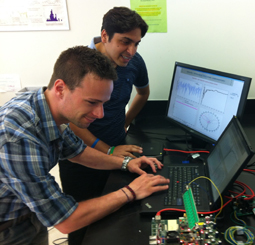 A team representing the Drexel Wireless Systems Laboratory (DWSL) has won the second place title at the 2013 Software Defined Radio Challenge organized by the Wireless Innovation Forum. The challenge was held at the 2013 Wireless Symposium and Summer School and was hosted by Virginia Tech.
A team representing the Drexel Wireless Systems Laboratory (DWSL) has won the second place title at the 2013 Software Defined Radio Challenge organized by the Wireless Innovation Forum. The challenge was held at the 2013 Wireless Symposium and Summer School and was hosted by Virginia Tech.
The team was led by Nikhil Gulati, a Ph.D. candidate in the Electrical and Computer Engineering (ECE) department along with Ph.D. candidate Damiano Patron, and was advised by Dr. Kapil Dandekar. The project, titled “SDR Integrated Cognitive Antenna System,” showcased an adaptive framework to leverage the capabilities of reconfigurable antennas for wireless link quality improvement. The demonstration involved a software-hardware system developed on top of a software defined radio platform.
The reconfigurable antennas developed at DWLS are the next generation of antennas and are capable of changing their operational state for improving wireless link connectivity and coverage. These antennas are compact enough to be added to a home wireless access point and to laptops.
“Due to the high quantity of users and limited frequency spectrum, there is a growing demand from the wireless industry in terms of new antenna technologies and techniques to improve wireless communications,” said Patron “At the DWLS we are focused on meeting this demand, through new reconfigurable antenna designs and algorithms.”
As opposed to standard static antennas, reconfigurable antennas are able to adapt their radiation patterns in response to the changing wireless channel. The control of their state is performed from the software-defined radio through an algorithm that senses the channel and selects the proper antenna configuration to achieve the best link performance.
The project’s framework demonstrates how the algorithm selects the best antenna configurations to improve the link quality between a user and the wireless access point. The demonstration showcased the smart algorithm and software developed at Drexel to control these antennas to improve the experience of a wireless user.
The inspiration behind the project was due to recent interest in the research community and wireless industry to make a wireless system and network intelligence.
“Considering that each home has now tens of WiFi devices with high demand applications like HD streaming, the combination of smart antennas and smart software can provide improved download and upload speeds, better wireless coverage and cost benefits,” Gulati explained.
This project will benefit the every day person’s use of the Internet through wireless networks for work, personal communication, and entertainment. The reconfigurable antenna technology and the algorithms developed for this project can improve wireless user experience in home and public WiFi networks. Looking ahead, the group hopes to bring this technology into the next generation of mobile devices.
Erica Faletto
Marketing and PR Assistant